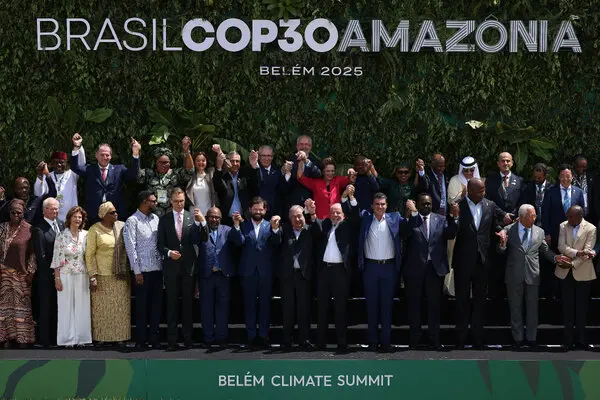Intimate live report by Dani of Food Tank, United States.
| Dear Siaka, We’re on the ground here at the 30th annual United Nations Climate Change Conference, also known as COP30, where tens of thousands of governmental, civil society, and private sector leaders and advocates are gathering for a two-week period that could be make-or-break for food systems and climate solutions. COP30 officially began Monday, and things have been off to a slow but steady start here. As we know, there’s a lot of work to do. Following two consecutive years of record-high global temperatures—along with continuing challenges surrounding emissions levels, biodiversity loss, food insecurity, and more—negotiators at COP30 need to get serious about protecting communities from the impacts of runaway climate change, scaling up creative climate solutions, and holding nations accountable to contribute financial resources. Last week before the official start of COP30, leaders from 43 countries and the European Union adopted the Belém Declaration on Hunger, Poverty and Human-Centered Climate Action. The declaration calls for climate financing to be rebalanced to, yes, still maintain mitigation efforts, but also significantly scale up investment in adaptation—in strengthening communities’ welfare and resiliency in an irreversibly changing world. In other words: Finally, we’re seeing what it looks like for global climate diplomacy to grapple with the effects of climate change on people and communities, particularly the poorest and most vulnerable. There are no climate solutions without climate justice. The declaration was spearheaded by Brazilian President Luiz Inácio Lula da Silva, who also oversaw his country lift 40 million people out of food insecurity over the past two years by centering family farmers and food access in national hunger policy. “Brazil’s recent history proves that when governments back family farmers and prioritise social policies, hunger falls. It’s good to see this politics reflected in the Belém Declaration, which signals a welcome shift—from shiny climate pledges to real-world impact on people,” says Raj Patel, an IPES-Food panel expert, author, filmmaker, and researcher. Reading through the Belém Declaration, I was pleased to see that within each subject are several specific action items for countries to consider adopting. It is also interesting to see China, a signatory to the declaration, continuing to step up its climate action while other large emitters like the United States, India, and Russia did not join the declaration. (In fact, the U.S., along with Afghanistan, Myanmar and San Marino, are the only countries not to register a delegation here at COP30, which is truly a shameful abdication of responsibility.) I think Raj is right, but I want to push back just a little: In my view, the Belém Declaration still does feel like a pledge; just a better one. What we actually need to see—desperately!—is investment. Action. Countries need to put their money where their mouths are. Or, we just have to stop holding our breath! We’ve seen time and time again that many rich countries, especially the U.S. in recent years, are increasingly unwilling to pay their fair share. So maybe it’s time that we roll up our sleeves and get the work done ourselves. A very interesting high-level climate finance report that just came out yesterday outlines “a comprehensive and feasible pathway” for developing nations to themselves mobilize the approximately US$3.2 trillion-per-year investment they need by 2035 to meet climate and development goals. It’s not easy, of course, and we’ll need other stakeholders—like The Rockefeller Foundation, which just announced yesterday that they’ll invest US$5.4 million to support regenerative ecosystems connected to Brazil’s school meal programs—to step forward. But a better, more equitable, more nourished world is possible. And COP30 is a crucial step toward building that world. So let’s keep our eyes on Belém over the next week and a half. And as always, my personal email is danielle@foodtank.com, so please do let me know what’s on your mind. How can I represent Food Tankers here at COP30? What questions do you have, and how can we continue to work together to keep our global leaders accountable? Onward, Dani |



